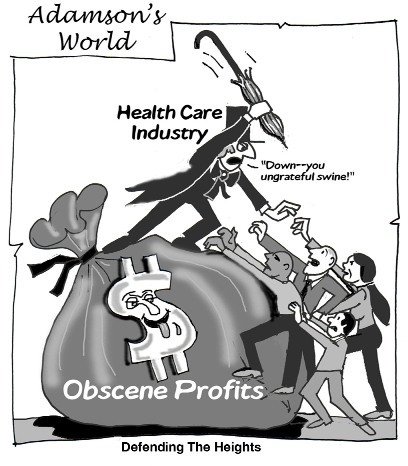"Obscene profits" is a term at once vague and arbitrary, all of it based upon the idea that a person can somehow determine that another's profit is, somehow, more than they deserve. That anyone can use that term and expect to be taken seriously, let alone do so with the idea that it should somehow go unchallenged without clarification is boggling.
This is the first in what is intended to be a larger series on the subject of profit and the functions of a corporation from both the mechanical and philosophical points of view. This is primarily an examination of the mechanics of corporate profits.

Whenever a corporation stands to profit some "huge" amount -- and the profit margin rarely enters into this discussion -- there are those who invariably will refer to the profits as "obscene". Yet, what is it, exactly, that determines what amount of profit is "obscene"? Indeed, by what determining factor is the profit even "huge".
Often times, supposedly "obscene" profits are a tiny fraction of total income; this means that compared to the company's expenditures (such as paying employees, meeting regulatory requirements, taxes et cetera) the profit was dangerously negligible. For example, when Exxon Mobile posts profits of $8.35B (this is their actual posted profit for Q4 2013) this is called "obscene". Yet since an initial spike in Q2 2012, Exxon has not exceeded 9.5% in profit margin. This means that for every dollar of income the company took in during that period, less than a dime of it was profit; that means that over $80,000,000,000 was meeting the company's expenditures. If you spend $80B creating value for society, why is it "obscene" that the company should have an excess value of a relatively paltry $8B?
The other aspect of this discussion is that "profit" is invariably shown as some huge pile of money some fatcat sits upon with a smug, miserly satisfaction and keeps from the rest of us (see above illustration). There is a problem with this: whether publicly traded or privately held, what is being discussed is corporate income, the profit of a business. This does not, by some strange magic, suddenly appear in said fatcat's pocket. A company is a box that stores money, is responsible for the regulatory compliance of the enterprise as a whole and allows employees to be paid prior to taxes and payroll fees; it is not a person. The profits are held in that box and are what allows the company to grow. Now, corporate growth is not some Seussian "business must grow" mumbo-jumbo: in order to do things like hire workers (that it must be explained that this is what creates jobs is embarrassing) the company must have capital (i.e. the held profits from the previous period). The new employee isn't just going to sit around and wait for the next revenue period to get paid; they expect to get paid when they do the job, not work on credit to the company. That money must come from somewhere.
Suddenly, Exxon's profits aren't so obscene: it means it can hire one more person for every ten (approximately; as mentioned, it must also pay regulatory compliance fees, taxes, non-employee maintenance costs such as new parts for ships). It means the company has in fact very little wiggle room over the next period.
As to the fatcat, he in fact only gets paid when the board of directors authorizes a dividend to investors, which in most cases will only be done if the company has more than sufficient capital to meet the next year's plans; and only if. In most cases, the company does not pay a dividend, especially in cases of publicly traded (and 9/10 non-banking companies of the most "obscene" size are publicly traded) companies which must meet a laundry list of regulatory requirements before a dividend can be paid.
Out of all those "obscene" profits, only a fraction might be paid out to investors. Being generous and saying 50% of a profit might be paid out in a dividend (anyone who owns stock in a publicly traded company knows how absurdly high that expectation is in most cases), that means our fatcat has only the tiniest ghost of a chance of seeing $4.5B out of $80B.
However, once again key facts are ignored; as mentioned, 9/10 of the non-banking largest companies are publicly traded. This means that there could be potentially thousands or even millions of fat cats (how many of you have Google, Inc in your 401(k) portfolios' prospectuses?) who are sharing that $4.5B. Exxon, for example, had over 200,000 outstanding shares as of this writing. Even if you were some magical "majority shareholder" who wasn't holding those shares as a proxy for thousands of other investors (i.e. a fund manager) which is highly unlikely for a publicly traded company, you might -- but could certainly not expect -- to see $2.25B; that means for every dollar the company you own created in value for society, you only saw $0.02. That's two copper Lincolns, not short for millions or billions.
Yes, those profits are so obscene. Even the infamous Martin Shkreli only has an estimated net worth of less than $75MILLION. Out of the billions of dollars of value created for society.
Now, this is not to say that some profits are not obscene; but it is not because it crossed the line into some imaginary "more than they deserve" territory which almost always translates into "more than you can think of spending". Rather, it is when companies use cronyism, lobbying and regulatory capture to secure monopolies and cartels against competition and new market entries; these profits are created not by providing value to society but by using government to smash anyone who might do it better than you. And that is obscene.

Thomas Shirk is a computer programmer, Voluntaryist and aspiring philosopher. Please come back to his blog or follow him on Facebook and Steemit for regular updates on Voluntaryism, capitalism and other philosophical insights
So, greed is good? Seriously? It's not the individual 'profits' of the 'excess value' created by the slaves, it is the compounding that has starving children in the streets outside overflowing food warehouses owned by people that have never done a constructive act in their lives. W.
Crapitalism, and feudalism before it, are what have led us here, why would those in charge of it change it? How can putting others in charge of it change the system that put them in power?
It's time for a hard reset that makes sure that rule by force can never be dominant again.
Free markets only insure that little money will always bow to big money, and since the criminals that have put these two demented puppets up for the throne have the biggest money, nothing will change.
Until the people rise up, rule by force is what we get.
Downvoting a post can decrease pending rewards and make it less visible. Common reasons:
Submit
Pretty sure I never said "greed is good"; you are taking your own ideals and using them to interpret what another person must be feeling. And since we are talking here about corporate profits, you are reifying a corporation (which is really just an abstract construct) and assigning emotions to it. A corporation can't be greedy. It is logically impossible.
As to food warehouses overflowing, you contradict yourself. You say the owners have never done a constructive act in their lives when in fact they have: they have bought property and put it to the use of warehousing food. This in turn has allowed more food to reach more people at lower cost to said people than ever before in history. If you have an idea outside of capitalism that can perform better, by all means implement it. So far every competing idea has failed, miserably.
#Venezuela
Downvoting a post can decrease pending rewards and make it less visible. Common reasons:
Submit